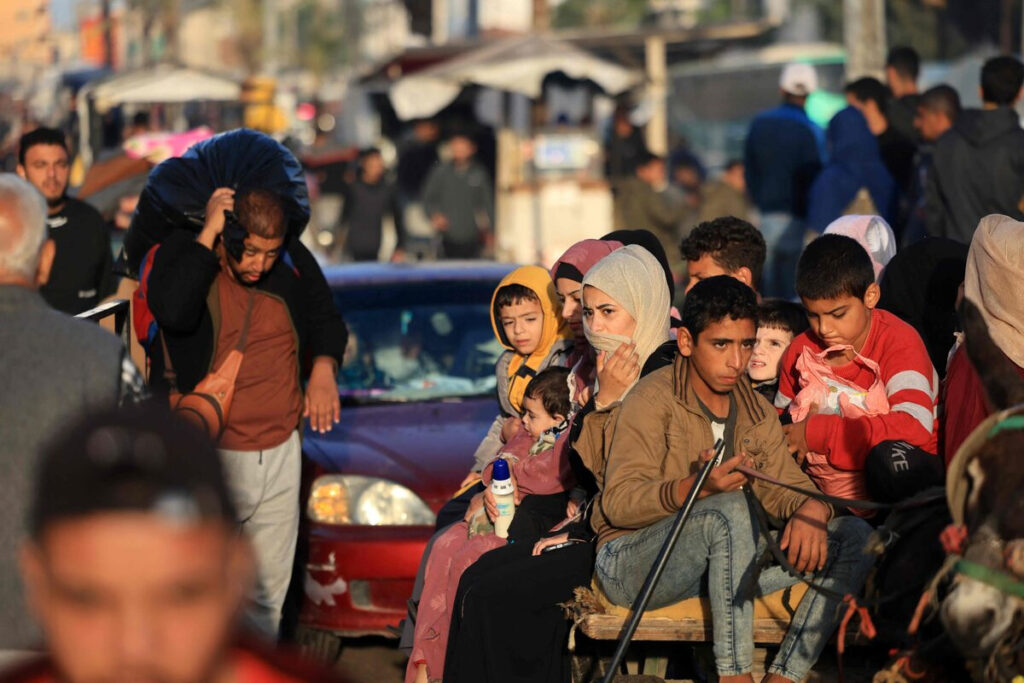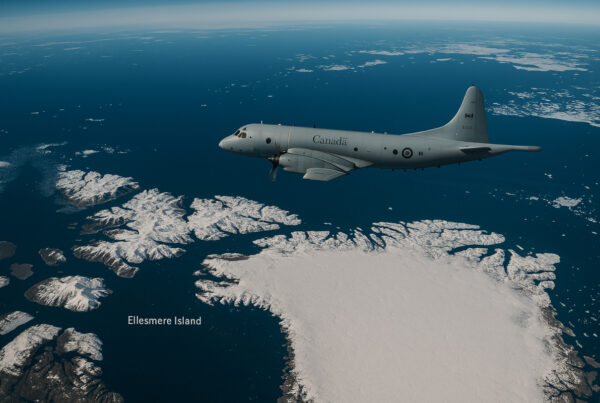
Palestinians return to their homes in eastern Khan Yunis in the southern Gaza Strip during the first hours of a four-day truce in the battles between Israel and Hamas militants, on Nov. 24.MAHMUD HAMS/AFP/GETTY IMAGES
(Written by Ann Hui. Originally published here in The Globe and Mail, republished with permission.)
With Israel’s war on Hamas focusing international attention on the plight of Palestinians, some in Canada are pressing Ottawa to help. But experts say this country has long struggled to find the right approach to assisting Palestinian refugees.
The issue came to the fore earlier this month, after a leaked Israeli intelligence memo identified Canada as a potential mass resettlement destination for Palestinians. The prospect of a large-scale relocation at Israel’s direction drew condemnation from Palestinian groups, and Ottawa was quick to dismiss the proposal.
Immigration Minister Marc Miller told journalists the idea was “fictional.” He said the government’s focus in the Hamas-controlled Gaza Strip, home to more than two million Palestinians, is “on Canadians. We want to get Canadians out.”
But when pressed on how Canada might respond to refugee claims from individual Palestinians in the future, he sidestepped the question.
Last month, a group of Palestinians living in Canada made headlines when they asked the Canadian government to open a humanitarian resettlement pathway for refugees fleeing Gaza. It’s a request that some refugee lawyers and advocates have echoed. No such plan has been announced.
“The Palestinian refugee issue – because of its numbers, because of the sensitivities of the Israel-Palestine crisis – remains the largest unresolved refugee crisis in the world, and probably with the greatest regional and international political ramifications,” said Michael Lynk, a former United Nations special rapporteur for the human rights situation in the Palestinian territories.
“It’s walking on glass,” said Mike Molloy, a former Canadian ambassador to Jordan. “A real minefield.”
The 1948 Arab-Israeli war resulted in the forced displacement of more than 700,000 Palestinians, many of them to the West Bank, the Gaza Strip, and Syria, Lebanon and Jordan. Today, there are 5.9 million Palestinian refugees registered with the United Nations, many of them living in refugee camps in the region.
“It’s a stain on the conscience of the modern world,” Mr. Lynk said.
Canada’s own policies have long made it challenging for Palestinian refugee claimants to come here.
The first challenge is getting here. Canada’s privately sponsored refugee program, under which private groups provide settlement assistance, works with UNHCR, the United Nations refugee agency, to identify refugees abroad. But the UNHCR system leaves out the majority of Palestinian refugees in places such as Lebanon and Jordan, where they are deemed to fall under the protection of a separate UN program, the United Nations Relief and Works Agency, or UNRWA.
When Mr. Miller was asked earlier this month about the potential for Palestinians fleeing Gaza to make Canadian refugee applications, he said officials in Canada hadn’t yet turned their minds to the question. Asked for further details, a spokesperson for Mr. Miller referred the question to Immigration, Refugees and Citizenship Canada.
Hamas releases 24 hostages as truce with Israel takes hold in Gaza
For Palestinian refugees, each application is considered “on a case-by-case basis, considering the same factors as any other applicant,” IRCC spokesperson Julie Lafortune said, including whether they are already receiving support from UNRWA. Applicants already receiving support from other countries, too, she said, “will generally not be eligible for resettlement.”
Mr. Molloy, whose long career in government included helping craft Canada’s refugee policies, said this doesn’t have to limit us.
“For resettlement purposes, we decide who is a refugee. Not the United Nations,” he said.
Another complication is that many Palestinians don’t want to be resettled. Many hope one day to return to the lands they or their ancestors lived on prior to 1948.
“Resettlement is a very, very loaded term, and deeply controversial,” said Rex Brynen, a McGill University professor who studies Middle East politics.
“It’s seen as assisting in ethnic cleansing.”
The international order has failed the Palestinians
Take, for instance, the case of former foreign affairs minister John Manley. In January, 2001, Mr. Manley was asked if Canada might consider welcoming Palestinian refugees as part of a larger resettlement plan. Canada was, at the time, chair of the Refugee Working Group, an international committee tasked with finding a solution for displaced Palestinians.
Mr. Manley’s response was, yes. If such a plan were approved as part of a larger Middle East peace deal and agreed upon by the Palestinian Authority, he said, Canada would be ready to accept Palestinian refugees.
This set off a firestorm. In the West Bank, outraged Palestinians marched the streets, burning an effigy of the Canadian foreign minister. Across the region, Canadian diplomats reported visits from protesters asking for Canadian flags to set aflame.
To Mr. Manley, who had been appointed to the foreign affairs post just a few months prior, it had seemed like a well-intentioned offer. But to many Palestinians his suggestion of “resettlement” was a major affront.
Because of UNHCR’s practice of excluding UNWRA refugees, the Palestinians who submit asylum claims in Canada are typically those who have been able to physically get here, either through a visitor or student visa or by travelling from the U.S., said Joshua Blum, a Toronto-based refugee lawyer who often works with Palestinian communities.
“The numbers who can get here are really small,” Mr. Blum said.
From 2018 until September of this year, about 3,400 Palestinian cases were referred to Canada’s Immigration and Refugee Board, IRB spokesperson Anna Pape said. During this same period, 79 per cent of refugee claims from Palestinians were accepted. As of earlier this year, according to UNHCR, Canada’s average acceptance rate for asylum claims was 78 per cent.
Those cases from Palestinian claimants, Mr. Blum said, are often hard-won.
“Canada gives Palestinians more difficulty than they should, I think,” he said.
Often, he said, claims are denied on grounds of inadmissibility – a criterion meant to filter out people with ties to criminal organizations or terrorism groups.
“It implements a kind of guilt by association,” Mr. Blum said. He said he has seen people rejected for having the loosest of ties to organizations deemed suspect. Or for having ties, for instance, to Fatah, the main rival to Hamas, which fulfills government and humanitarian functions in the West Bank and in refugee camps.
“In the Palestinian case we have not been thoughtful,” Prof. Brynen said. “If you’re a Palestinian making a refugee claim in Canada, it is frankly a roll of the dice whether you’re going to be treated in a thoughtful, understanding way, or whether there’s going to be some ridiculous opposition to your claim.”
Asked about this, Ms. Pape said the IRB’s members are “independent decision makers” who receive extensive training. “Each case is decided individually based on the facts of the case,” she added.
Mr. Blum said the many sensitivities shouldn’t be an excuse for inaction.
He acknowledged the “very personal decision” that each Palestinian faces, but he also pointed to the “horrific situation and massive loss of life in Gaza” over the past few weeks. He noted that Canada has put emergency resettlement programs in place in the past, for refugees from Syria and Afghanistan.
“For the Palestinians who do want to settle in Canada and get to safety, it’s very easy to put a policy or emergency mechanism in place,” he said.
“To just leave nothing for those who really do want to get out can lead to the impression that some people’s lives are worth less than others.”
With a report from The Canadian Press








